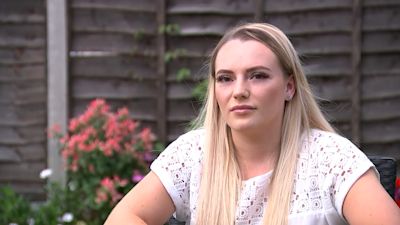Ireland’s first female gymnastic Olympian 'forced to quit or face life in a wheelchair'

As Ireland's first ever female Olympic gymnast Ellis O'Reilly is a genuine history-maker; an achievement to make her immensely proud and one she can treasure for the rest of her life.
Or so you would imagine.
The sadness is that she doesn’t see it that way at all, in fact, when she recalls her stunning career and the impact it’s had on her life she struggles to control the tears.
“It makes me really upset that yeah, it was great. I got to the Olympics, but at what cost? I now have health problems from it, I know have a lot of health problems from the sport. I suffer back pain still. Sorry. Can we just stop?”
Ellis needs to pause our interview to collect herself.
Four years on from her retirement, but still only 22, she has never spoken about the damage gymnastics has done to her body and her soul.
Like all young gymnasts who have aspirations to get to the top, Ellis trained relentlessly.
Occasionally that was with Gymnastics Ireland which she says she always enjoyed, but most of her time was spent at her home gym, Europa Centre.
At Europa, despite daily, often double doses of prescription-only pain killers she says she found the training regime excruciating.
“Every training session, I would just be crying my eyes out because the pain was horrific.
"I would finish a training session, come home and just lay on the floor and cry in my kitchen for about half an hour, until I could physically get myself up to go and have a shower to go to bed.”
We have heard so often in the past few weeks the pressure on gymnasts at their clubs to ignore injury where possible and to keep training however much it hurts.
Girl, 8, describes bullying by gymnastics coaches as review is pledged
'Beaten and starved': Stars allege abuse at heart of British Gymnastics
Calls for resignations at top of British Gymnastics as abuse allegations mount
With Ellis there were many issues, from dislocated knees to broken wrists, but she says the most persistent was a problem with her back.
An MRI scan once revealed she had eight bulging discs.
“It made me realise that whether I'd had a broken back, whether I did have a dislocated knee, no matter what I was going to be made to compete, regardless of how injured I was or how much I was in pain. It didn't matter.”
At the age of 17, her talent and dedication won her a place at the Olympics with Team Ireland, but tragically the moment she'd sacrificed so much for, the pinnacle of a brilliant career ended in dangerous disappointment.
She had a shocking looking fall when dismounting from the beam and landed on her head.
A scan taken after she returned home revealed not only a broken neck but also showed that long before that final run into Rio, she'd been training on three back fractures.
“We went to a specialist after the MRI and he said, if you continue gymnastics, you would probably have health conditions for the rest of your life.
"And if you have another fall like you did in the Olympics, you will be in a wheelchair,” she says.
The scary realisation of just how close she was to permanent paralysis came on the back of abusive posts on social media about her Olympic accident.
That abuse and the trauma of her Rio experience contributed to her developing seizures. At their worst she was getting 20 a day and she became too nervous to even leave the security of the family home.
“After the fall, I did receive trolling online as well. Things such as: 'She should never have been chosen. Her fall was a complete embarrassment.'
"A lot of stress, anxiety, fear over the years, everything that had built up and the seizure was the only way that my body could release it,” Ellis says.
Ellis maintains she has good memories of her times with Gymnastics Ireland.
She told me: “They’ve always made me feel really welcome.
"I always felt like I was an asset to their team and they welcomed me with open arms and made me feel comfortable. Whatever I needed, it was never a problem and I always experienced the utmost care and attention from them.”
It is clear Ellis does not see her experiences with Europa in the same way.
In a statement to ITV News Europa Centre denied any wrongdoing and said: "The welfare of children is always of paramount importance to us, and we were therefore shocked and saddened to hear these claims. We have always sought to place the welfare of gymnasts at heart of what we do."
Gymnastics nearly broke Ellis O'Reilly, another casualty of a system that has finally been shamed into taking a long hard look at itself.
That self-reflection has only come about thanks to the bravery of gymnasts like Ellis, who are finally prepared to share their stories, hoping the gymnastics world will become a better place as a result.
We owe it to all of them, and the next generation of young gymnasts, to ensure that happens.